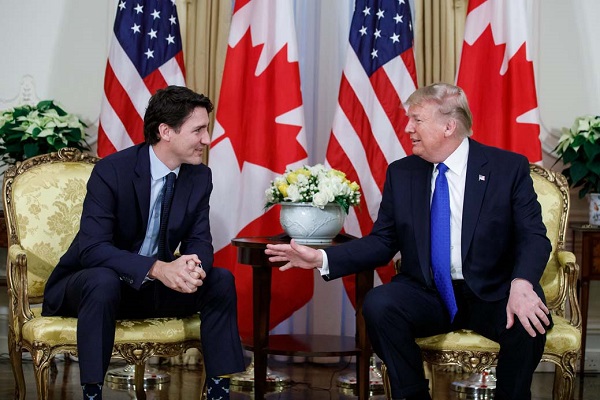Automotive
Bad ideology makes Canada’s EV investment a bad idea


It doesn’t bode well for our country that our economic security rests on tariff exceptions to be negotiated by Liberal politicians who have spent the majority of Trump’s public life calling him a “threat to liberal democracy” and his supporters racists and fascists. Their hostility doesn’t lend itself to fruitful diplomacy. In any event, Trump’s EV rollback and aggressive tariffs will spell disaster for the Canadian EV sector.
What does Donald Trump’s resounding win in the recent U.S. election mean for Canada? Unfortunately, there doesn’t seem to have been much thought about the answer to this question in Ottawa, because the vast majority of our political and pundit class expected his opponent to be victorious. Suddenly they’re all having to process this unwelcome intrusion of reality into their narrow mental picture.
Well, what does it mean?
It is early days, and it will take some time to sift through the various policy commitments of the incoming Trump Administration to unpack the Canadian angle. But one thing we do know is that a Trump presidency will be no friend to the electric vehicle industry.
A Harris administration would have been. But, Trump spent much of his campaign slamming EV subsidies and mandates, pledging at the Republican National Convention in July that he will “end the electric vehicle mandate on day one.”
This line was so effective, especially in must-win Michigan, with its hundreds of thousands of autoworkers, that Kamala Harris was forced to assure everyone who listened that the U.S. has no EV mandate, and that she has no intention of introducing one.
Of course, this wasn’t strictly true.
First, the Biden Administration, of which Harris was a part, issued an Executive Order with the explicit goal of a “50% Electric Vehicle Sales Share” by 2030. The Biden-Harris Administration (to use their own formulation) instructed their Environmental Protection Agency (EPA) to introduce increasingly stringent tailpipe emission regulations on cars and light trucks with an eye towards pushing automakers to manufacture and sell more electric and hybrid vehicles.
Their EPA also issued a waiver which allows California to enact auto emissions regulations that are tougher than the federal government’s, which functions as a kind of back-door EV mandate nationally. After all, auto companies aren’t going to manufacture one set of vehicles for California, the most populous state, and another for the rest of the country.
And as for intentions, though the Harris camp consistently held that her prior policy positions shouldn’t be held against her, it’s hard to forget that as senator she’d co-sponsored the Zero-Emission Vehicles Act, which would have mandated that all new vehicles sold in the U.S. be “zero emission” by 2040. During her failed 2020 presidential campaign, Harris accelerated that proposed timeline, saying that the auto market should be all-electric by 2035.
In other words, she seemed pretty fond of the EV policies which Justin Trudeau and Steven Guilbeault have foisted upon Canada.
For Trump, all of these policies can be filed under “green new scam” climate policies, which stifle American resource development and endanger national prosperity. Now that he’s retaken the White House, it is expected that he will issue his own executive orders to the EPA, rescinding Biden’s tailpipe instructions and scrapping their waiver for California. And though he will be hindered somewhat by Congress, he’s likely to do everything in his power to roll back the EV subsidies contained in the (terribly named) Inflation Reduction Act and lobby for changes limiting which EVs qualify for tax credits, and how much.
All of this will be devastating for the EV industry, which is utterly reliant on the carrots and sticks of subsidies and mandates. And it’s particularly bad news for the Trudeau government (and Doug Ford’s government in Ontario), which have gone all-in on EVs, investing billions of taxpayer dollars to convince automakers to build their EVs and batteries here.
Remember that “vehicles are the second largest Canadian export by value, at $51 billion in 2023 of which 93% was exported to the U.S.,” according to the Canadian Vehicle Manufacturers Association, and “Auto is Ontario’s top export at 28.9% of all exports (2023).”
Canada’s EV subsidies were pitched as an “investment” in an evolving auto market, but that assumes that those pre-existing lines of trade will remain essentially unchanged. If American EV demand collapses, or significantly contracts without mandates or tax incentives, we’ll be up the river without a paddle.
And that will be true, even if the U.S. EV market proves more resilient than I expect it to. That is because of Trump’s commitment to “Making America Great Again” by boosting American manufacturing and the jobs it provides. He campaigned on a blanket tariff of 10 percent on all foreign imports, with no exceptions mentioned. This would have a massive impact on Canada, since the U.S. is our largest trading partner.
Though Justin Trudeau and Chrystia Freeland have been saying to everyone who will listen how excited they are to work with the Trump Administration again, and “Canada will be fine,” it doesn’t bode well for our country that our economic security rests on tariff exceptions to be negotiated by Liberal politicians who have spent the majority of Trump’s public life calling him a “threat to liberal democracy” and his supporters racists and fascists. Their hostility doesn’t lend itself to fruitful diplomacy.
In any event, Trump’s EV rollback and aggressive tariffs will spell disaster for the Canadian EV sector.
The optimism that existed under the Biden administration that Canada could significantly increase its export capacity to the USA is going down the drain. The hope that “Canada could reestablish its export sector as a key driver of growth by positioning itself as a leader in electric vehicle and battery manufacturing, along with other areas in cleantech,” in the words of an RBC report, is swiftly fading. It seems more likely now that Canada will be left holding the bag on a dying industry in which we’re invested heavily.
The Trudeau Liberals’ aggressive push, driven by ideology and not market forces, to force Electric Vehicles on everyone is already backfiring on the Canadian taxpayer. Pierre Poilievre must take note — EV mandates and subsidies are bad for our country, and as Trump has demonstrated, they’re not a winning policy. He should act accordingly.
Automotive
Canada’s EV experiment has FAILED

By Dan McTeague
The government’s attempt to force Canadians to buy EVs by gambling away billions of tax dollars and imposing an EV mandate has been an abject failure.
GM and Stellantis are the latest companies to back track on their EV plans in Canada despite receiving billions in handouts from Canadian taxpayers.
Dan McTeague explains in his latest video.
Automotive
Carney’s Budget Risks Another Costly EV Bet

From the Frontier Centre for Public Policy
GM’s Ontario EV plant was sold as a green success story. Instead it collapsed under subsidies, layoffs and unsold vans
Every age invents new names for old mistakes. In ours, they’re sold as investments. Before the Carney government unveils its November budget promising another future paid for in advance, Canadians should remember Ingersoll, Ont., one of the last places a prime minister tried to buy tomorrow.
Eager to transform the economy, in December 2022, former prime minister Justin Trudeau promised that government backing would help General Motors turn its Ingersoll plant into a beacon of green industry. “By 2025 it will be producing 50,000 electric vehicles per year,” he declared: 137 vehicles daily, six every hour. What sounded like renewal became an expensive demonstration of how progressive governments peddle rampant spending as sound strategy.
The plan began with $259 million from Ottawa and another $259 million from Ontario: over half a billion to switch from Equinox production to BrightDrop electric delivery vans. The promise was thousands of “good, middle-class jobs.”
The assembly plant employed 2,000 workers before retooling. Today, fewer than 700 remain; a two-thirds collapse. With $518 million in public funds and only 3,500 vans built in 2024, taxpayers paid $148,000 per vehicle. The subsidy works out to over half a million dollars per remaining worker. Two out of every three employees from Trudeau’s photo-op are now unemployed.
The failure was entirely predictable. Demand for EVs never met the government’s plan. Parking lots filled with unsold inventory. GM did the rational thing: slowed production, cut staff and left. The Canadian taxpayer was left to pay the bill.
This reveals the weakness of Ottawa’s industrial policy. Instead of creating conditions for enterprise, such as reliable energy, stable regulation, and moderate taxes, progressive governments spend to gain applause. They judge success by the number of jobs announced, yet those jobs vanish once the cameras leave.
Politicians keep writing cheques to industry. Each administration claims to be more strategic, yet the pattern persists. No country ever bought its way into competitiveness.
Trudeau “bet big on electric vehicles,” but betting with other people’s money isn’t vision; it’s gambling. The wager wasn’t on technology but narrative, the naive idea that moral intention could replace market reality. The result? Fewer jobs, unwanted products and claims of success that convinced no one.
Prime Minister Mark Carney has mastered the same rhetorical sleight of hand. Spending becomes “investment,” programs become “platforms.” He promises to “catalyze unprecedented investments” while announcing fiscal restraint: investing more while spending less. His $13-billion federal housing agency is billed as a future investment, though it’s immediate public spending under a moral banner.
“We can build big. Build bold. Build now,” Carney declared, promising infrastructure to “reduce our vulnerabilities.” The cadence of certainty masks the absence of limits. Announcing “investment” becomes synonymous with action itself; ambition replaces accountability.
The structure mirrors the Ingersoll case: promise vast returns from state-directed spending, redefine subsidy as vision, rely on tomorrow to conceal today’s bill. “Investment” has become the language of evasion, entitlement and false pride.
As Carney prepares his first budget, Canadians should remember what happened when their last leader tried to buy a future with lavish “investment.”
A free economy doesn’t need bribery to breathe. It requires the discipline of risk and liberty to fail without dragging a country down. Ingersoll wasn’t undone by technology but by ideological conceit. Prosperity cannot be decreed and markets cannot be commanded into obedience.
Every age invents new names for old mistakes. Ours keeps making the same ones. Entitled hubris knows no bounds.
Marco Navarro-Genie is vice-president of research at the Frontier Centre for Public Policy and co-author, with Barry Cooper, of Canada’s COVID: The Story of a Pandemic Moral Panic (2023).
-

 Environment2 days ago
Environment2 days agoThe era of Climate Change Alarmism is over
-

 Aristotle Foundation1 day ago
Aristotle Foundation1 day agoB.C. government laid groundwork for turning private property into Aboriginal land
-

 Business2 days ago
Business2 days agoYou Won’t Believe What Canada’s Embassy in Brazil Has Been Up To
-

 Crime1 day ago
Crime1 day agoPublic Execution of Anti-Cartel Mayor in Michoacán Prompts U.S. Offer to Intervene Against Cartels
-

 Bruce Dowbiggin16 hours ago
Bruce Dowbiggin16 hours agoA Story So Good Not Even The Elbows Up Crew Could Ruin It
-

 Alberta16 hours ago
Alberta16 hours agoCanada’s heavy oil finds new fans as global demand rises
-

 Automotive2 days ago
Automotive2 days agoCarney’s Budget Risks Another Costly EV Bet
-

 Addictions15 hours ago
Addictions15 hours agoThe War on Commonsense Nicotine Regulation



